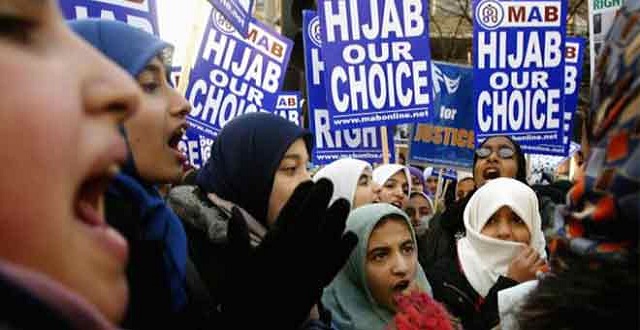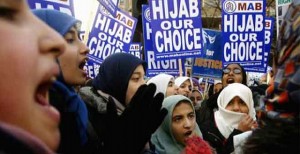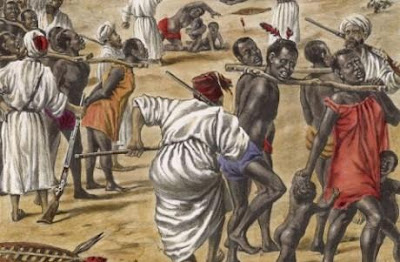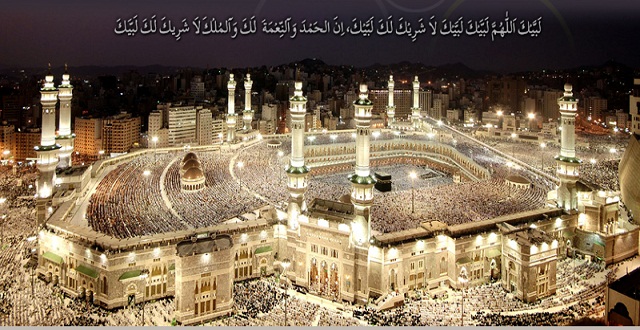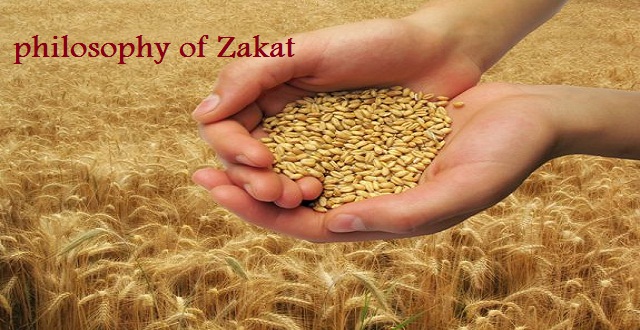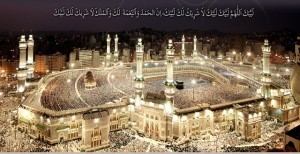
There are four dimensions associated with this great act of worship – each one more deep-rooted and beneficial than the other.
The Ethical Dimension
The most important philosophy of Hajj is the ethical transformation which it induces within man. The ritual of ‘ihram’ entirely removes man from material ostentations, external distinctions, extravagant clothing and ornaments. By prohibiting pleasures and engaging him in self-rectification – one of the duties of a ‘muhrim’,1 it distances him from the material world and engrosses him in a world of light, purity and spirituality. Consequently, it causes those who, in ordinary circumstances, find themselves weighed down by the burden of make-believe distinctions, ranks and honours, to suddenly feel light, easy and relaxed.
Subsequently, the performance of the other rituals of Hajj, one after the other, continually brings man closer to his Lord, strengthens his spiritual connection with Him, distances him from his gloomy and sinful past, and guides him towards a bright, luminous and pure future.
Every step of the Hajj-rituals is reminiscent of the events associated with Ibrahim (a.s), Isma`il (a.s) and his mother Hajar J, and personifies before man their self-sacrifice, altruism and struggle (in the path of Allah). The city of Makkah in general, and the Masjidul Haram, the Ka’bah and the place of circumambulation in particular, bring to mind the memories of the Noble Prophet (s.a.w), the holy Imams (a.s) and the struggle of the Muslims during the period of early Islam. As a result, this ethical transformation tends to be deeper and more profound such that in every corner of Masjidul Haram and the city of Makkah, man visualizes the faces of the Noble Prophet (s.a.w), ‘Ali (a.s) and the other holy Imams G, and hears the enthusiastic slogans of their mission.
Indeed, all these together pave the way for an ethical revolution within hearts that are receptive and in a manner that is indescribable, and causes man to turn over a new leaf and opens up a new chapter in his life. It is not without reason that we read in our traditions that one, who performs Hajj, completely and perfectly…
يَخْرُجُ مِنْ ذُنُوبِهِ كَهَيْئَتِهِ يَوْمَ وَلَدَتْهُ أُمُّهُ.
“Becomes free of sins just as he was on the day when his mother gave him birth.”2
Truly, Hajj is a second birth for the Muslims – a birth which is the beginning of a new human life.
It is needless to mention that these effects and benefits, and those that we shall mention later, are neither for those who only content themselves with its exterior leaving aside its core, nor for those, who only view it as a means for recreation, tourism, pretension, dissemblance and acquiring personal material items – never acquainting themselves with its spirit and essence. Their share would only be that which they had set out to achieve!
The Political Dimension
As has been stated by one of the renowned Islamic jurisprudents, the Hajj rituals, apart from putting on display the most sincere and profound acts of worship, are also the most effective means for advancing the political objectives of Islam.
The essence of worship is attention towards Allah, while the essence of politics is attention towards the ‘creation of Allah’ – and these two aspects are observed to be as closely intertwined in Hajj as the yarns in a fabric!
Hajj is an effective factor in establishing unity amongst the ranks of the Muslims.
Hajj is an instrument to combat nationalistic and racial fanaticism, and oppose confinement (of the Muslims) within their geographical boundaries.
Hajj is a means for eliminating the shackles of censorship and breaking the stranglehold of the oppressive leaderships prevalent in the Islamic nations.
Hajj is a tool for transferring news of political affairs of the Islamic nations from one corner of the globe to another, and finally, it is an effective means for breaking the fetters of captivity and colonialism, and liberating the Muslims.
Consequently, during the period when oppressive tyrants like those belonging to the Umayyad and the ‘Abbasid dynasties ruled over the Islamic regions and kept every kind of interaction between the various segments of the Muslims under close scrutiny in order to crush any kind of liberty-seeking uprising, the advent of the season of Hajj was an opening towards freedom, interaction between various segments of the great Islamic society and discussion of various political issues.
One can see why the Commander of the Faithful (a.s), expounding the philosophy that lay behind every act of worship in connection with Hajj, states:
أَلْحَجَّ تَقْوِيَةً لِلدِّينِ.
“Allah has ordained (the rituals of) Hajj for the purpose of strengthening the religion.”3
Again, it is not without reason that an eminent non-Muslim statesman has stated: Woe unto the Muslims if they do not perceive the meaning (and significance) of Hajj and woe unto their enemies if they (the Muslims) ever happen to perceive it.
Even in the Islamic traditions Hajj has been regarded as the Jihad of the feeble ones. It is a Jihad in which even the old and weak men and women can join and have a contribution in exhibiting the greatness and grandeur of the Islamic ummah. By standing in circles around the holy Ka’bah and attesting to Allah’s unity and greatness, they cause the hearts of the enemies of Islam to palpitate in trepidation.
The Cultural Dimension
The interaction between the various segments of the Islamic society during the season of Hajj can turn out to be the most effective factor for cultural exchanges and transfer of thoughts and ideas. This is especially so because the grand gathering of Hajj is in reality, a true and natural representation of all the segments of the Muslims of the world (as there is no forced, forged or artificial factor involved in the selection of those proceeding for Hajj.
The pilgrims are individuals who come from all segments, races and languages associated with the Muslims all over the world, who have gathered under one roof). Thus we read in the traditions: One of the benefits of Hajj is the spread of the traditions of the Noble Prophet (s.a.w) throughout the entire Islamic world.
Hisham b. Hakam, one of the learned companions of Imam as-sadiq (a.s) says: I questioned the Imam (a.s) about the philosophy that lay behind the performance of Hajj and the circumambulation of the Ka’bah whereupon he (a.s) replied: “Allah created the servants … and for the welfare of their worldly and religious affairs, He sent down His commandments for them – one of them being the congregation of the people from the East and the West (for the Hajj rituals).
This, in order that the Muslims become acquainted with one another, become aware of the states of each other, and (so that) every group transfers its business investments from one city to another … and in order that the memories and traditions of the Noble Prophet (s.a.w) become known, and the people bring them to mind and do not forget them.”4
It was on this basis that the Muslims, during the suffocating eras in which the tyrannical caliphs and rulers had prohibited them from spreading these rulings, made use of this opportunity (of Hajj) to interact with the Imams G and eminent religious scholars for solving their problems, understanding the rulings of Islam and comprehending the traditions and customs of the Noble Prophet (s.a.w).
On the other hand, Hajj possesses the ability to be transformed into a gigantic cultural assembly in which scholars and intellectuals of the Islamic world, come together for a few days in Makkah, propounding their thoughts and exhibiting their creativity before the others.
Essentially, one of the great catastrophes is that the boundaries between the Islamic nations become the cause for them to separate from each other, culturally. As a consequence, Muslims of each nation only reflect upon their own selves and their own state of affairs, and this is something that effectively works towards dismembering and dissecting the single Islamic society; indeed, Hajj has the ability to stem this evil outcome.
How beautifully has Imam as-sadiq (a.s) stated in that tradition of Hisham b. Hakam when he said: “If all the people were to be concerned only about their respective countries and the problems existing therein, all of them would suffer destruction, their countries would face ruination, their benefits and welfare would be lost, and realities would become obscured and concealed.”
The Financial Dimension
Contrary to what some people imagine, utilizing the great assembly of Hajj for strengthening the financial foundations of the Islamic nations is not inconsistent with the spirit of Hajj. Instead, according to the Islamic traditions, it constitutes one of the philosophies for it.
What harm is there if the Muslims in that great gathering, were to lay the foundations of a common and associated Islamic market, and pave the way for commercial transactions amongst themselves in a manner in which neither do their profits enter the pockets of their enemies nor does their economy become dependent upon the others? An act of this type would not be called ‘craving for the world’ but rather, it would constitute an act of worship and Jihad (in the way of Allah).
In that tradition of Hisham b. Hakam from Imam as-sadiq (a.s), an express reference has been made towards this aspect that one of the objectives of Hajj is strengthening the commerce of the Muslims and facilitating economic association and cooperation amongst them.
In another tradition, Imam as-Sadiq (a.s), interpreting the verse…
لَيْسَ عَلَيْكُمْ جُناحٌ أَنْ تَبْتَغُوا فَضْلاً مِنْ رَبِّكُمْ
“There is no blame on you in seeking bounty from your Lord.”5
… says: The meaning of this verse is ‘seeking livelihood’.
إِذَا أَحَلَّ الرَّجُلُ مِنْ إِحْرَامِهِ وَ قَضَى فَلْيَشْتَرِ وَ لْيَبِعْ فِي الْمَوْسِمِ.
“And when a person comes out of his iHram and completes the Hajj, he should conduct business transactions during the season of Hajj (for instead of being a sin it carries rewards.)”6
This meaning is also witnessed in a tradition7 from Imam ‘Ali b. Musa al-Ridha (a.s) which explicitly enumerates the philosophies and objectives underlying the rites of Hajj; in the tradition, the Imam (a.s) recites the following verse of the Noble Qur`an:
لِيَشْهَدُوا مَنَافِعَ لَهُمْ
“That they may witness advantages for them”8,
A reference to the fact that the verse alludes to the spiritual benefits as well as the material ones – although both of them, from one perspective, can be looked upon as being spiritual in nature.
In short, if this great worship were to be utilized correctly and perfectly, and the pilgrims of the House of Allah, at a time when they are active and their hearts are emotionally ready in that holy land, were to make use of this great opportunity for solving the various problems that plague the Islamic society by establishing various political, cultural and mercantile assemblies, it would surely serve to untie the knots and solve the problems. Perhaps this is why Imam as-sadiq (a.s) has said:
لاَ يَزَالُ الدِّينُ قَائِماً مَا قَامَتِ الْكَعْبَةُ.
“The religion shall continue to stand as long as the Ka’bah continues to do so.”9
Imam ‘Ali (a.s) too has said:
أَللٌّهَ اللٌّهَ فِي بَيْتِ رَبِّكُمْ فَلاَ يَخْلُو مِنْكُمْ مَا بَقِيتُمْ فَإِنَّهُ إِنْ تُرِكَ لَمْ تُنَاظَرُوا.
“Fear Allah in the matter of His House (Ka’bah)! Do not desert it for if it is deserted, divine reprieve shall be taken away from you.”10
In view of the immense significance of the above issue, in the Islamic sources of traditions a separate chapter has been devoted to the ruling that if it were to ever happen that in a particular year the Muslims decide to refrain from going for Hajj, it would become obligatory upon the Islamic government to send them to Makkah by means of force!1112
Hajj, An Important Worship for Human Development
The journey for Hajj is a divine one and, in reality, a great migration; an expansive field for self-development, self-rectification and the Greatest Battle (Jihad-e-Akbar).
The Hajj rituals collectively are an act of worship profoundly associated with the struggle of Ibrahim (a.s) his son Isma`il (a.s) and his wife Hajar and if we were to remain heedless of this aspect while studying the secrets and objectives of Hajj, many of its rites and rituals would only float before us as enigmas; the solution to this lies in keeping this deep association within our sights during the course of the study.
When we come to the sacrificial grounds in Mina, the innumerable sacrifices performed there leave us amazed and perplexed; basically, is it possible for animal-sacrifice to be a part of the rituals associated with an act of worship?
But when we bring to mind the incident of Ibrahim (a.s) when he sincerely endeavoured to sacrifice his nearest and dearest one in the path of Allah subsequent to which the sacrifice at Mina came into existence in the form of a custom, we comprehend the philosophy lying behind it.
Offering sacrifice, in reality, implies one’s total disregard for everything else when striving in the way of Allah and is a demonstration of cleansing one’s heart from everything other than Allah. The reformative and educative effects of these rites can be derived in sufficient measure only when the entire scenario of the sacrifice of Isma`il (a.s) andfs the spiritual state of the father and the son leading up to the sacrifice is incarnated before man’s eyes and this spiritual state casts its influence upon him.13
When we proceed towards Jamarat (three stone pillars, which the pilgrims strike with pebbles – each one to be struck with seven pebbles – in a special ritual of Hajj), the rituals there appear enigmatic and inexplicable to us and we are given to wonder as to what could be the idea behind stoning a lifeless stone pillar and what problem could such an act possibly solve?
However, when we bring to mind the struggle of Ibrahim (a.s) – the champion of monotheism – against the whisperings of the Satan, who appeared before him on three occasions – each time seeking to weaken his resolve and distract him from the Jihad-e-Akbar (The Greatest Battle) – and on each occasion Ibrahim (a.s) repelled him by means of stones, these rites appear more meaningful and comprehensible to us.
These rituals convey the meaning that: Throughout your lives, all of you too, are in confrontation with the whisperings of the Satans during the Jihad-e-Akbar (Greatest Battle), and until you do not stone them and drive them away, you shall never be victorious. If you desire that Allah, just as He had sent His salutations upon Ibrahim (a.s) and made his name and doctrine eternal, should also cast His look of grace and favour upon you, then you must follow his (a.s) path too.
When we arrive at safa and Marwah where we observe the people repeatedly moving to and fro between one small mountain and another even smaller one without getting anything – at times walking and at times running – we are surely overtaken by astonishment as to what kind of ritual this is and what could it possibly mean and signify.
But then, when we bring to mind the efforts of Hajar for saving the life of her suckling child in that hot and scorching desert, and how Allah, after her sincere efforts, granted her wish by making the water of Zamzam to flow from beneath the foot of her new-born child, the clock suddenly turns back for us, the curtains tend to get lifted and we find ourselves near Hajar, accompanying her in her quest and efforts. In the path of Allah, one cannot hope to attain any rank and status without exertion and effort!
From what we have presented above, it can be easily concluded that Hajj should be taught in this manner; the memories of Ibrahim (a.s) his son and his wife should be personified step by step so that not only is the philosophy of Hajj perceived and comprehended, but also its profound ethical effects illuminate and influence the souls of the pilgrims – for without these effects the entire Hajj is nothing but a mere façade.14
—————————————————————————————
1. One who has worn the ihram. (Tr.)
2. Bihar al-Anwar, vol. 99, pg. 26
3. Nahj al-Balagha, Saying 252
4. Wasa`il ash-Shia, vol. 8, pg. 9
5. Suratul Baqarah (2), Verse 198
6. Tafsir ‘Ayyashi, as stated by Tafsir al-Mizan, vol. 2, pg. 86
7. Bihar al-Anwar, vol. 99, pg. 32
8. Suratul Hajj (22), Verse 28 (Tr.)
9. Wasa`il ash-Shia, vol. 8, pg. 14
10. Nahj al-Balagha, letter 47
11. Wasa`il ash-Shia, vol. 8, pg. 15 (The Chapter of ‘Obligation Upon The Governor To Compel The People For Hajj’)
12. Tafsir-e-Namunah, vol. 14, pg. 76
13. Unfortunately, of late, the sacrificial rites have come to acquire an undesirable form and the Islamic scholars must strive to rectify it.
14. Tafsir-e-Namunah, vol. 19, pg. 125






